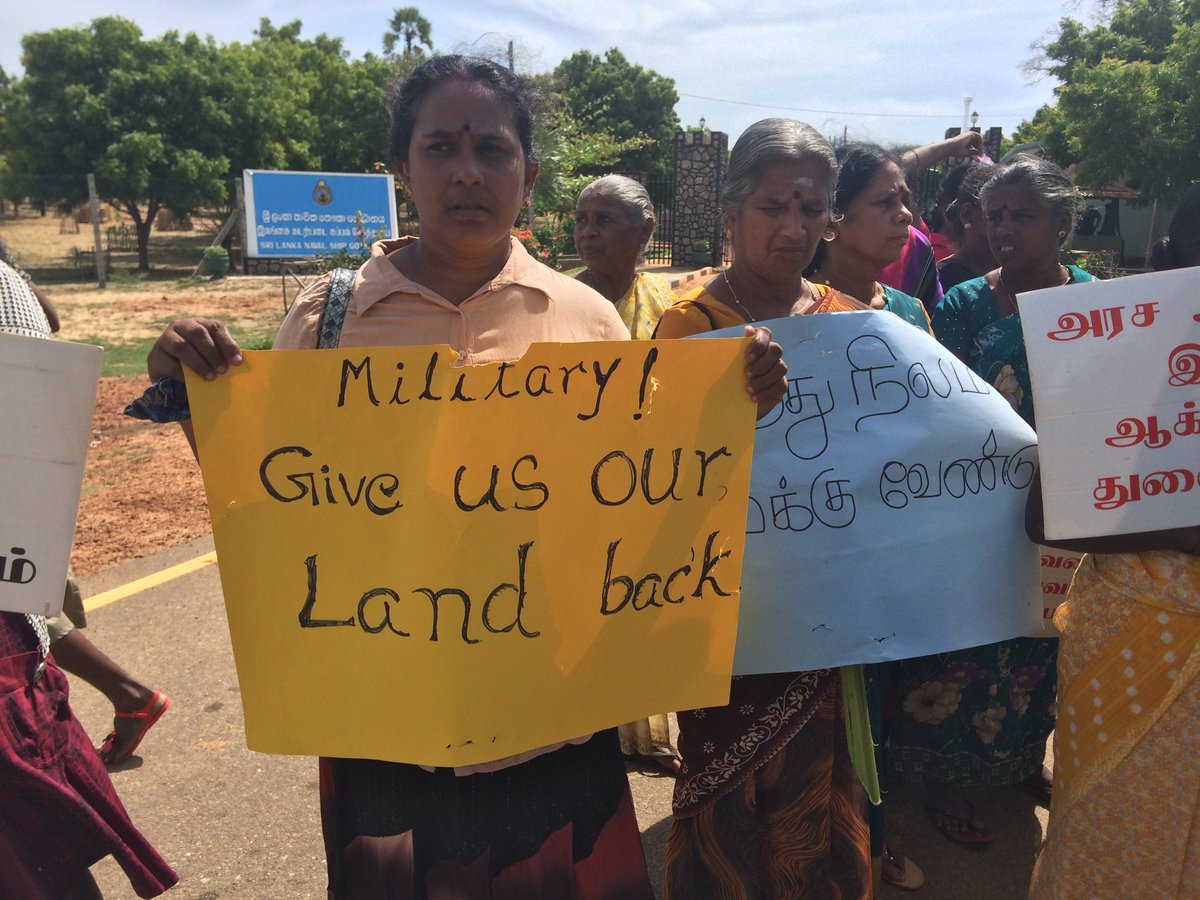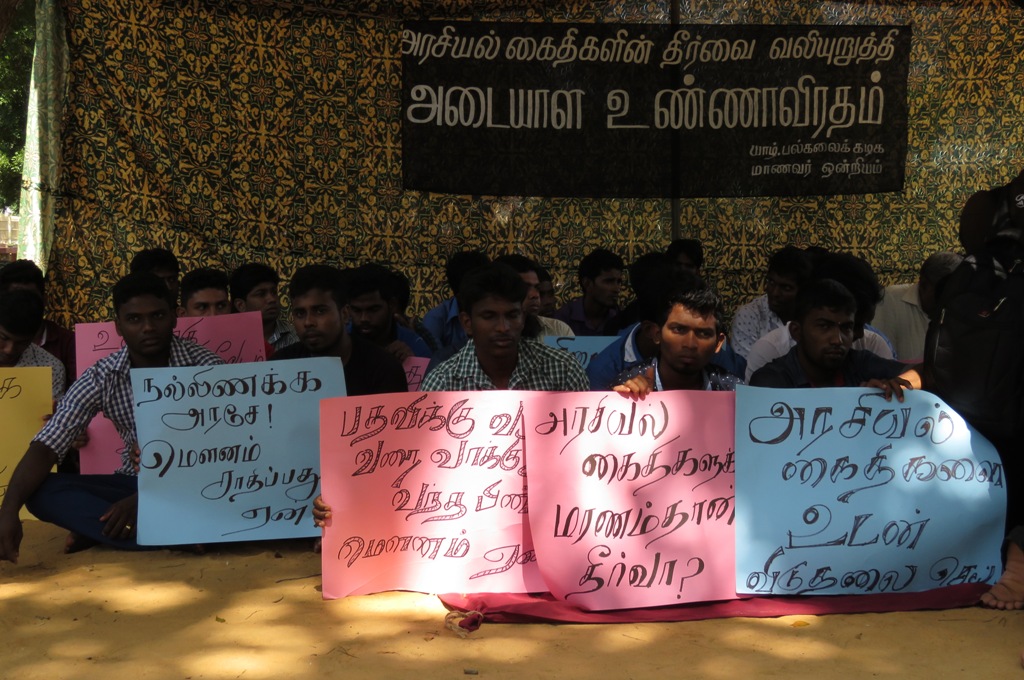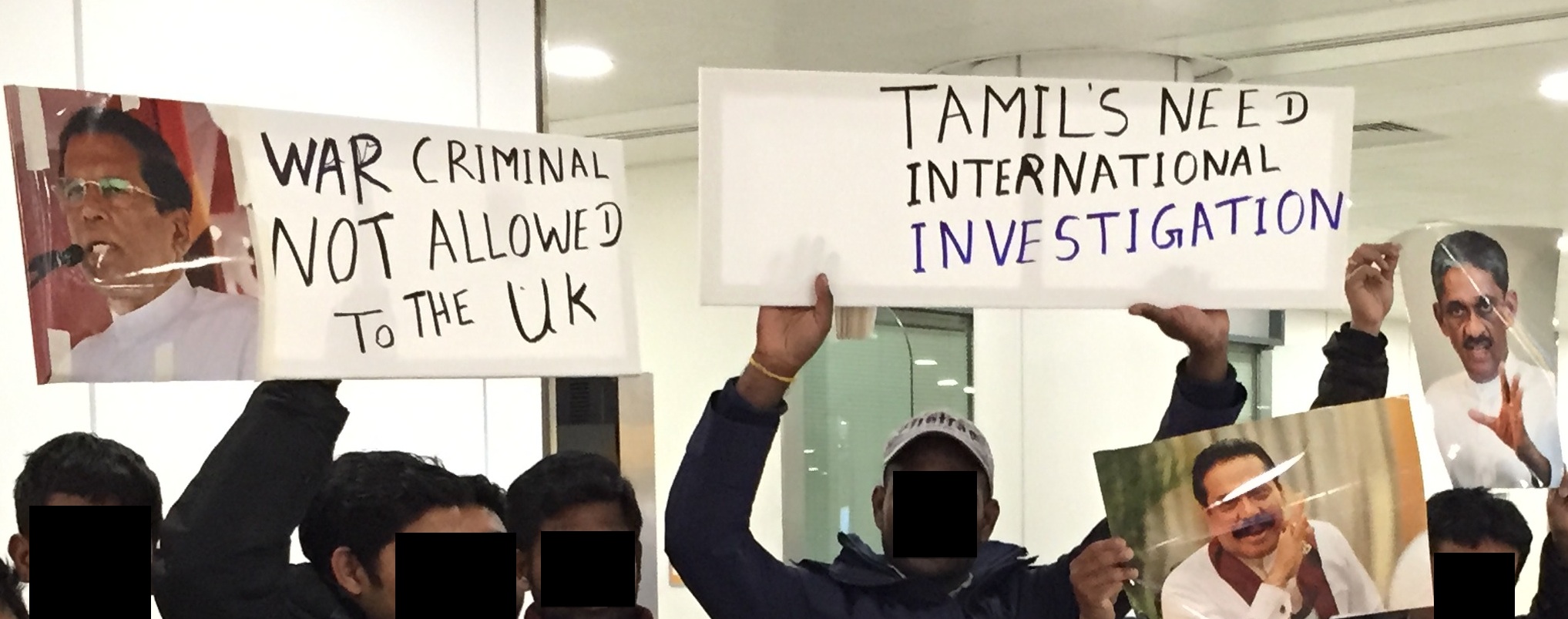Tamils in the northern province of Sri Lanka carried out a one-day strike on October 25 in protest against police repression, Tamilnet said. The strike was called by Tamil political parties after the October 20 murder of two Jaffna University students by Sinhalese police officers.
Tamil Eelam
 Tamils protest on August 3 against Sri Lankan navy land grabs in Mullivaikkal.
Tamils who had been protesting outside a military cantonment in a suburb of Kilinochchi began a hunger strike on September 7.
Tamils protest on August 3 against Sri Lankan navy land grabs in Mullivaikkal.
Tamils who had been protesting outside a military cantonment in a suburb of Kilinochchi began a hunger strike on September 7.
 Chief minister of the Northern Provincial Council, CV Wigneswaran, addressing a commemorative event at Mullivaikkal, May 18. Photo: Tamil Guardian.
Tamils throughout the north and east of the island of Sri Lanka held ceremonies on May 18 to remember those who died in the genocidal war waged by the Sri Lankan Army against the Tamil people.
Chief minister of the Northern Provincial Council, CV Wigneswaran, addressing a commemorative event at Mullivaikkal, May 18. Photo: Tamil Guardian.
Tamils throughout the north and east of the island of Sri Lanka held ceremonies on May 18 to remember those who died in the genocidal war waged by the Sri Lankan Army against the Tamil people.
 University of Jaffna students stage hunger strike in solidarity with fasting prisoners. Photo: Tamilnet.com.
Fourteen Tamil prisoners have been on hunger strike since February 22. They are demanding the release of all Tamil political prisoners and prisoners of war.
University of Jaffna students stage hunger strike in solidarity with fasting prisoners. Photo: Tamilnet.com.
Fourteen Tamil prisoners have been on hunger strike since February 22. They are demanding the release of all Tamil political prisoners and prisoners of war.
 Protest against visit of Maithripala Sirisena to Britain, March 2015.
The elaborate public facade carefully constructed by Sri Lankan President Maithripala Sirisena, with the hidden assistance of India and the US, is crumbling by the day. Instead, the discomforting truth is revealed that despite Sirisena becoming president last year, Sri Lanka remains a brutal regime dominated by a military mindset.
Protest against visit of Maithripala Sirisena to Britain, March 2015.
The elaborate public facade carefully constructed by Sri Lankan President Maithripala Sirisena, with the hidden assistance of India and the US, is crumbling by the day. Instead, the discomforting truth is revealed that despite Sirisena becoming president last year, Sri Lanka remains a brutal regime dominated by a military mindset.
 February 4 protest in Vavuniyaa.
Tamils in the north and east of Sri Lanka held protests on February 4, the former British colony's independence day.
February 4 protest in Vavuniyaa.
Tamils in the north and east of Sri Lanka held protests on February 4, the former British colony's independence day.
 Tamils protest for the release of political prisoners. Colombo, October 2015.
When Maithripala Sirisena was elected as president of Sri Lanka in January last year, he promised to end human rights violations by the security forces.
Under Sirisena's predecessor, Mahinda Rajapaksa, it was common practice for the army and police to abduct people and torture them. Some were later released, while others were murdered.
Tamils protest for the release of political prisoners. Colombo, October 2015.
When Maithripala Sirisena was elected as president of Sri Lanka in January last year, he promised to end human rights violations by the security forces.
Under Sirisena's predecessor, Mahinda Rajapaksa, it was common practice for the army and police to abduct people and torture them. Some were later released, while others were murdered.
About 300 Tamil political prisoners in 11 prisons began a hunger strike on October 12.
Many of the prisoners have been detained without trial under the Prevention of Terrorism Act. Some have been in jail for up to 20 years.
They are accused of being members of the Liberation Tigers of Tamil Eelam (LTTE), which fought for an independent Tamil homeland in the north and east of the island of Sri Lanka, but was defeated in 2009.
The United Nations Human Rights Council has unanimously adopted a resolution called “Promoting Reconciliation, Accountability and Human Rights in Sri Lanka”.
This resolution, of which the United States was the main sponsor, welcomed a proposal by the Sri Lankan government to establish a “judicial mechanism” to investigate “abuses of human rights and violations of international humanitarian law”.
The United Nations' Office of the High Commissioner for Human Rights (OHCHR) report of its investigation into human rights violations in Sri Lanka found “reasonable grounds to believe that gross violations of international human rights law … were committed.”
The investigation deals with the period between February 2002 and November 2011. It thus includes the final years of the war between the Sri Lankan government and the Liberation Tigers of Tamil Eelam. The LTTE fought for an independent Tamil homeland in the north and east of the island of Sri Lanka and was defeated in May 2009.
 Kokilavany is contesting in the Sri Lankan parliamentary election in 2015 on behalf of the All Ceylon Tamil Congress Party, which is part of the Tamil National People’s Front (TNPF). She spoke to Lalitha Chelliah on Community Radio 3CR's Tamil Manifest program on August 1.
* * *
Kokilavany is contesting in the Sri Lankan parliamentary election in 2015 on behalf of the All Ceylon Tamil Congress Party, which is part of the Tamil National People’s Front (TNPF). She spoke to Lalitha Chelliah on Community Radio 3CR's Tamil Manifest program on August 1.
* * *
 Protest demanding investigation of war crimes. Jaffna, Sri Lankan-occupied Tamil Eelam, February 24.
Sri Lankan President Maithripala Sirisena has dissolved parliament and called elections for August 17. Sirisena was elected president on January 9, replacing Mahinda Rajapaksa.
Protest demanding investigation of war crimes. Jaffna, Sri Lankan-occupied Tamil Eelam, February 24.
Sri Lankan President Maithripala Sirisena has dissolved parliament and called elections for August 17. Sirisena was elected president on January 9, replacing Mahinda Rajapaksa.
- Previous page
- Page 2
- Next page



